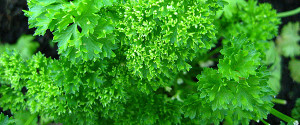The name “parsley” derives from the Greek word meaning “rock celery” as it is related to celery. A native of the Mediterranean, parsley was used medicinally before it was eaten as a food.
Parsley has a whopping amount of vitamin K making it an important herb to add to meals to help support bone health. It’s also a great immune-supporting herb with a surprisingly high amount of vitamin C. Parsley also is packed with phytochemicals, such as myristicin, which is helpful in supporting glutathione, an important antioxidant within our bodies that vigilantly protects us from oxidative damage. So get that parsley off the side of the plate—better than a garnish, it should be a part of the main event! Here are some easy ways to help you get more of this nourishing herb into your meals.
Combine chopped parsley with bulgar wheat, chopped green onions (scallions), mint leaves, lemon juice and olive oil to make the Middle Eastern classic dish, tabbouleh.
Add parsley to pesto sauce to add more texture to its green color.
Combine chopped parsley, garlic and lemon zest, and use it as a rub for chicken, lamb and beef.
Use it in soups and tomato sauces.
Serve a colorful salad of fennel, orange, cherry tomatoes, pumpkin seeds and parsley leaves.
Chopped parsley can be sprinkled on a host of different recipes, including salads, vegetable sautés and grilled fish.
We thank The World’s Healthiest Foods for these great ideas for using parsley.

